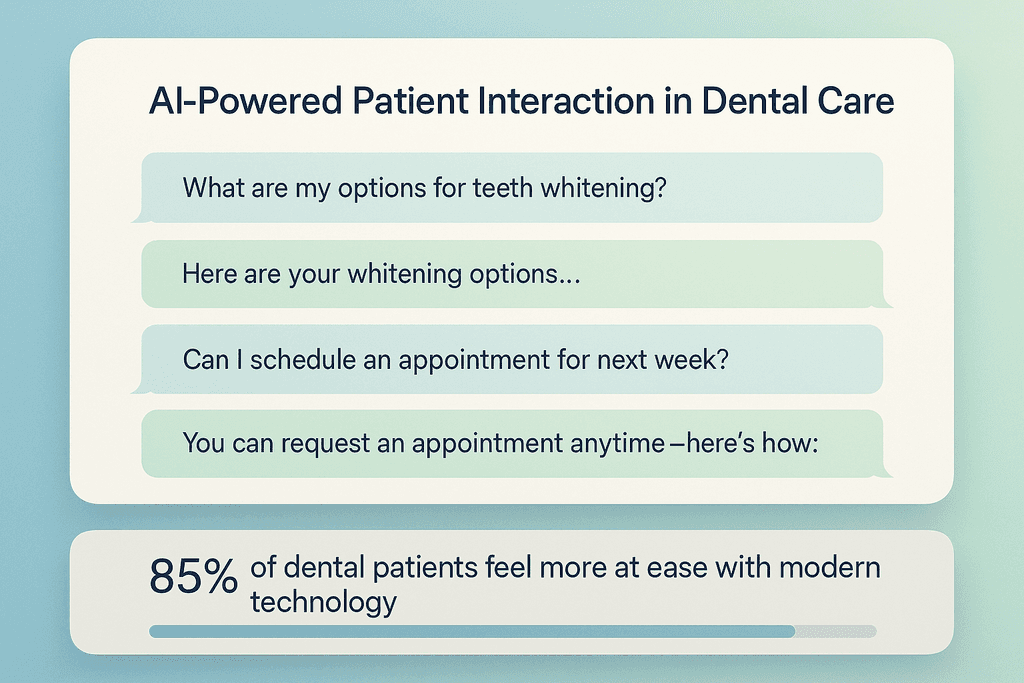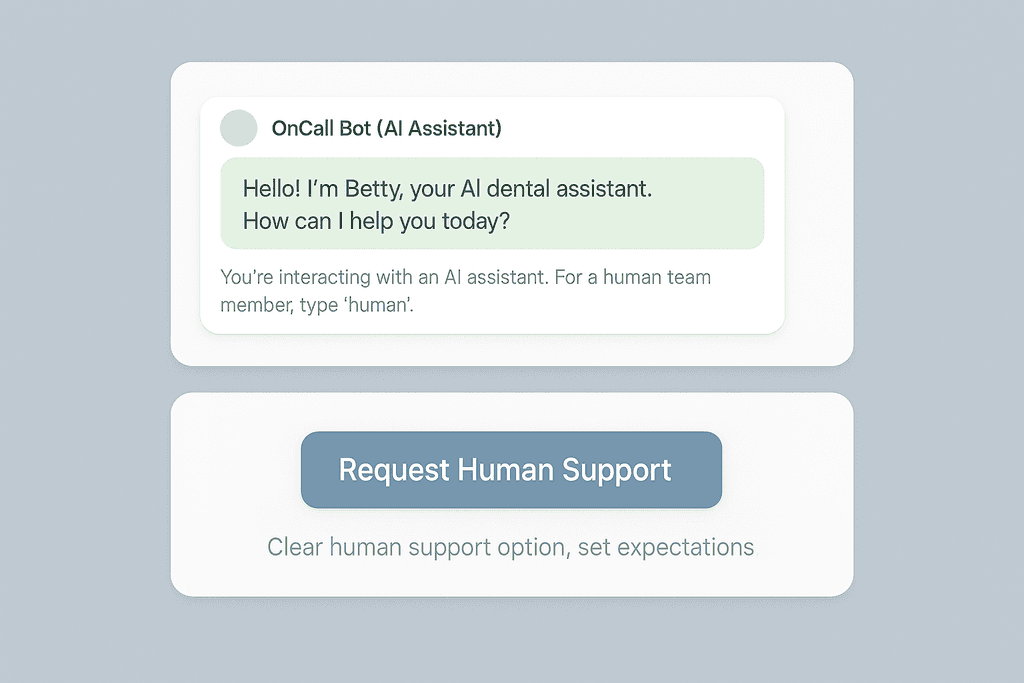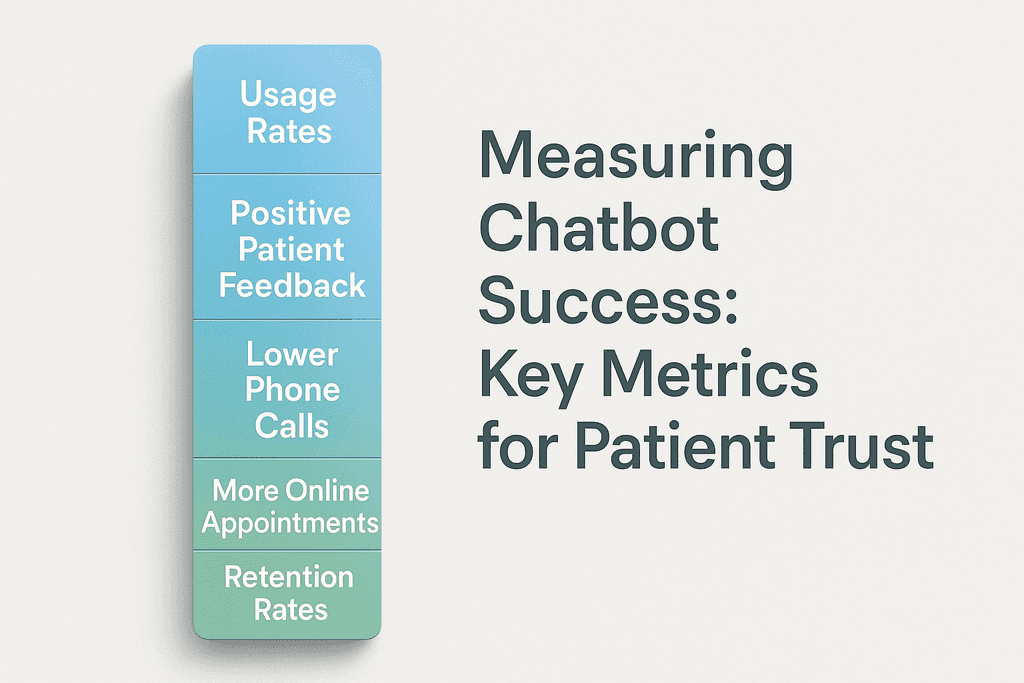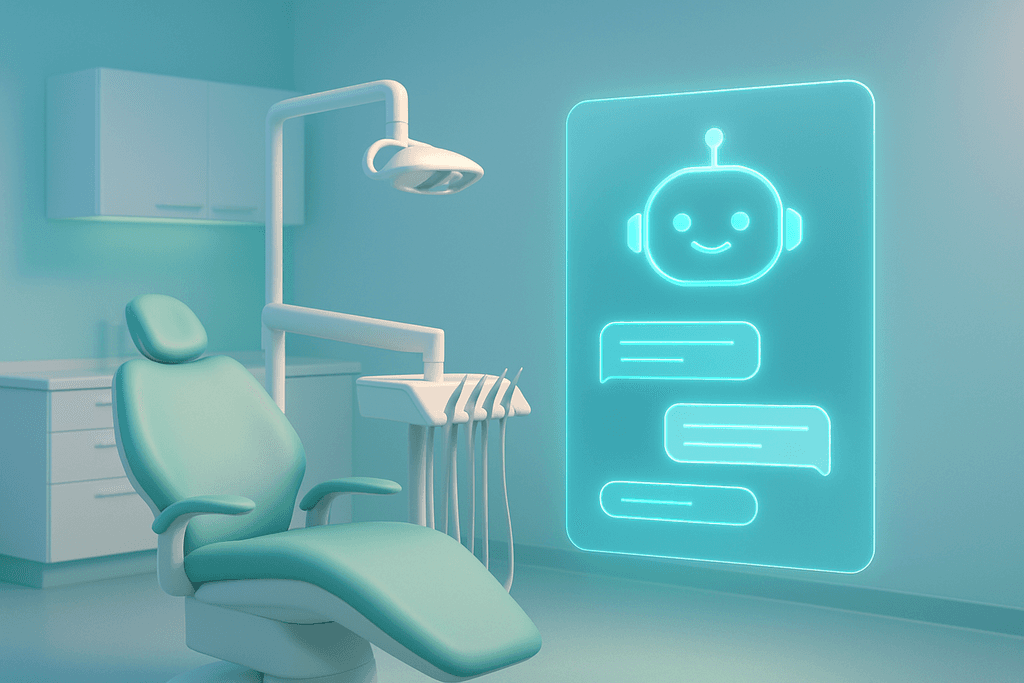Imagine walking into a dental office and being greeted by a friendly, knowledgeable assistant available 24/7 to answer your questions and schedule appointments. This scenario is becoming reality as more dental practices adopt AI-powered chatbots to enhance patient communication and build trust. By providing instant, personalized responses and streamlining administrative tasks, dental chatbots like The OnCall Bot are revolutionizing how practices engage with patients and manage their operations efficiently.
Table of Contents
Understanding Patient Trust in Digital Dentistry
Did you know that 85% of dental patients feel more at ease when their dentist uses modern technology? This growing acceptance of digital tools in dentistry opens new doors for patient care and communication.

Dental practices are quickly adopting AI-powered solutions to enhance patient experiences. However, building trust with these new technologies remains a key challenge. Let’s explore the current landscape:
- Patient attitudes towards AI in healthcare
- Factors influencing trust in digital dental tools
- Opportunities for chatbot adoption in dentistry
A recent survey revealed interesting insights about patient perceptions:
| Patient Sentiment | Percentage |
|---|---|
| Comfortable with AI in healthcare | 62% |
| Prefer human interaction for health concerns | 73% |
| Trust AI for appointment scheduling | 81% |
These numbers show a mix of excitement and caution. Patients appreciate the convenience of digital tools but still value human touch in their care.
Several factors shape patient trust in dental technology:
- Ease of use
- Privacy and data security
- Accuracy of information
- Integration with human staff
Chatbots present a unique opportunity to bridge the gap between digital efficiency and personal care. When designed well, they can:
- Provide instant, 24/7 support
- Offer consistent, accurate information
- Free up staff time for more complex patient needs
- Reduce anxiety by answering questions anytime
As dental practices navigate this digital shift, finding the right balance is key. Tools like The OnCall Bot aim to enhance patient trust by combining AI efficiency with a warm, human-like approach to dental care communication.
Understanding these trends helps dental practices make informed decisions about adopting new technologies. The goal is clear: use digital tools to improve care while maintaining the personal touch patients value.
Personalizing the Chatbot Experience
When it comes to building patient trust with dental chatbots, personalization is key. Patients want to feel heard and understood, even when interacting with AI. By tailoring the chatbot experience, dental practices can create a more welcoming and trustworthy environment.
- Patient-specific data integration
- Customized language and tone
- Personalized recommendations
One effective way to personalize the chatbot experience is by integrating patient data. This allows the chatbot to greet returning patients by name and reference their past appointments or treatments. It’s a small touch that can make a big difference in how patients perceive the interaction.
Tailoring the chatbot’s language and tone to match your practice’s style is another crucial step. If your office has a warm, friendly vibe, your chatbot should reflect that in its responses. This consistency helps patients feel more at ease, as if they’re chatting with a familiar face at the front desk.

Ensuring Transparency and Setting Expectations
Being upfront about what your dental chatbot can and can’t do is essential for building trust. Patients appreciate honesty, and setting clear expectations helps prevent frustration or disappointment.
- Clearly identify the chatbot as an AI assistant
- Communicate the scope of chatbot services
- Provide easy options for human support
It’s important to let patients know they’re talking to an AI right from the start. This transparency sets the stage for a more trusting interaction. You might be surprised, but many patients actually prefer chatting with a bot for quick, straightforward tasks.
- Appointment scheduling
- Basic dental care questions
- Office hours and location info
By clearly outlining what the chatbot can help with, you’re setting realistic expectations. And when a patient needs something beyond the bot’s capabilities, make sure there’s an easy way to connect with a human staff member. This seamless handoff shows patients that while the chatbot is helpful, your practice still prioritizes personal care.

Integrating Human Touch with Chatbot Efficiency
The goal isn’t to replace human interaction, but to enhance it. Dental chatbots work best when they’re part of a larger patient care strategy that combines technology with the irreplaceable human touch.
| Task | Chatbot Role | Human Role |
|---|---|---|
| Appointment Scheduling | Initial booking, reminders | Confirmation, special requests |
| Patient Questions | Basic FAQs, triage | Complex inquiries, personalized advice |
| Follow-up Care | Automated check-ins | Personalized care plans, addressing concerns |
Training your staff to work alongside chatbot technology is crucial. They should understand how the chatbot works and be ready to step in when needed. This collaboration ensures patients get the best of both worlds – quick, efficient responses for simple matters, and thoughtful, personalized care for more complex needs.
Remember, the chatbot is a tool to support your team, not replace them. By using it to handle routine tasks, your staff can focus on building deeper relationships with patients. This balance of efficiency and personal touch is what truly builds trust in the long run.
At The OnCall Bot, we’ve designed our dental chatbot to seamlessly integrate with your practice’s workflow. It handles the basics while freeing up your team to provide that all-important human connection. By combining AI efficiency with your staff’s expertise, you create a patient experience that’s both high-tech and high-touch.

Measuring Success and Iterating
Building patient trust with dental chatbots isn’t a one-and-done process. It requires ongoing assessment and refinement. Let’s dig into how practices can measure success and keep improving their chatbot interactions.
Key metrics for gauging patient trust and satisfaction include:
- Chatbot usage rates
- Positive sentiment in patient feedback
- Reduction in phone call volume
- Increase in online appointment bookings
- Patient retention rates
Gathering patient feedback is crucial. Smart practices use:
- Post-chat surveys
- Follow-up emails
- Social media listening
- Review site monitoring
This data goldmine helps pinpoint areas for improvement. For example, The OnCall Bot’s detailed conversation transcripts let dental offices spot common patient concerns and refine responses.
| Feedback Type | Action Item |
|---|---|
| Confusion about services | Update chatbot knowledge base |
| Requests for human contact | Adjust escalation thresholds |
| Praise for quick answers | Expand FAQ coverage |
Continuous improvement strategies might include:
- Regular script updates based on patient questions
- A/B testing different chatbot personalities
- Integrating new features like appointment reminders
Remember, the goal is to make patients feel heard and cared for, even in digital interactions. As this article on AI chatbots in dentistry points out, personalization is key. By fine-tuning your chatbot’s responses and capabilities, you’re not just improving a tool – you’re enhancing the entire patient experience.
Wrap-up
Building patient trust with dental chatbots is all about finding the right balance. We’ve seen how these AI assistants can make life easier for both patients and dental practices. They’re available 24/7, answer questions quickly, and help schedule appointments. But it’s important to use them in a way that feels personal and caring.
As chatbots get smarter, they’ll be able to do even more. Soon, they might help explain treatment plans or send reminders about oral health habits. The key is to keep the human touch. Dental practices should use chatbots to free up time for more meaningful patient interactions, not replace them entirely.
If you’re curious about how a dental chatbot could work for your practice, The OnCall Bot offers features designed specifically for dentists. It’s worth checking out to see if it fits your needs. As we move forward, the practices that blend technology with genuine care will likely see the best results in patient trust and satisfaction.
Now, let’s address some common questions about dental chatbots and patient trust.
Common Questions About Dental Chatbots and Patient Trust
How do dental chatbots protect patient privacy?
Dental chatbots are designed with strict privacy measures in place. They use encrypted connections and don’t store personal health information. The OnCall Bot, for example, only keeps conversation transcripts for authorized staff to review, helping maintain HIPAA compliance while improving patient care.
Can a chatbot handle complex dental questions?
While chatbots are great for basic inquiries, they’re programmed to recognize when a question is too complex. In these cases, they promptly escalate the issue to a human team member. This ensures patients always get accurate information and appropriate care.
Do chatbots replace personal care from dental staff?
Not at all. Chatbots complement human care by handling routine tasks, freeing up staff to focus on more complex patient needs. They’re a tool to enhance, not replace, the personal touch that’s so important in dental care.
How do chatbots build trust with dental patients?
Chatbots build trust by providing instant, accurate responses to patient questions at any time. They offer consistent information, reduce wait times, and ensure patients feel heard. The OnCall Bot, for instance, uses a friendly persona to create a welcoming experience that patients appreciate.
What if a patient prefers talking to a real person?
Most dental chatbots, including The OnCall Bot, offer an easy way for patients to connect with human staff if they prefer. The goal is to provide options, not force patients into using technology they’re not comfortable with.
How do dental practices benefit from using chatbots?
Dental practices see numerous benefits from chatbots. They reduce phone call volume, automate appointment scheduling, and provide 24/7 patient support. This leads to improved efficiency, better patient satisfaction, and more time for staff to focus on in-office patient care.

No responses yet